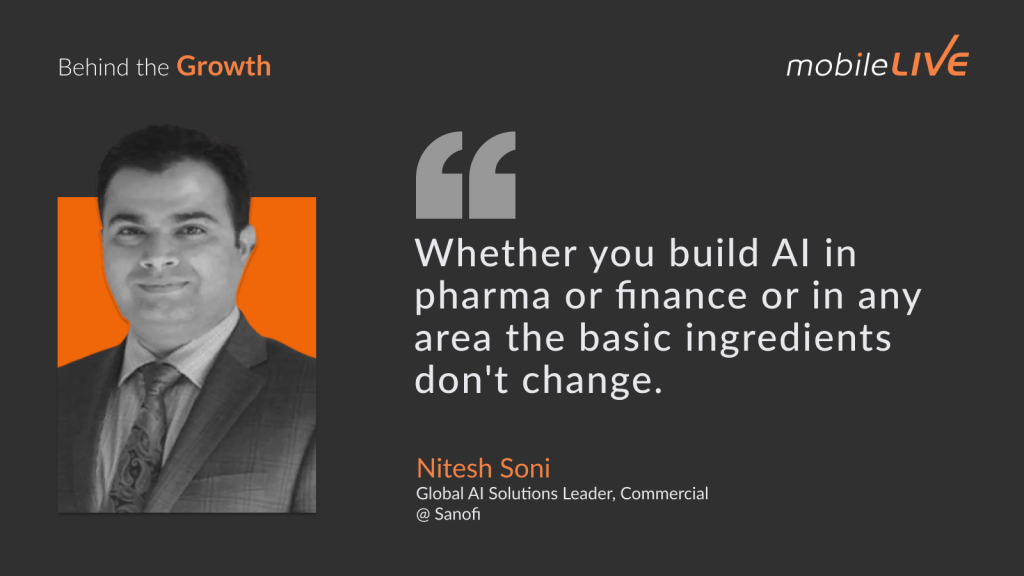Key Insights
Leveraging AI Across Different Industries
Nitesh discusses how foundational AI technologies and strategies can be effectively transferred across different sectors, from finance to pharmaceuticals. He emphasizes that while the core elements of AI applications—data accuracy, technology, and appropriate tools—remain consistent, the specific business problems and regulatory environments vary, necessitating tailored AI solutions. Nitesh highlights how his experiences in finance helped him implement scalable AI frameworks within the pharmaceutical industry, thereby accelerating drug development and enhancing patient care.
Importance of Team Diversity in Global Settings
In his role at Sanofi, Nitesh underlines the significance of creating diverse and inclusive teams, especially in a global company where cultural sensitivities can impact communication and collaboration. He points out the differences in communication styles across various regions, and how understanding and adapting to these differences is crucial for fostering a high-performance culture. Nitesh shares his strategies for integrating diverse perspectives, which helps in developing AI solutions that are not only innovative but also culturally attuned and unbiased.
AI’s Transformational Role in Pharmaceutical Industry
Nitesh provides insights into how AI is fundamentally transforming the pharmaceutical industry, particularly in drug discovery and patient care. He notes the shift towards more personalized medicine and how AI is enabling this through more precise drug development processes and targeted patient treatment strategies. Nitesh also mentions the impact of generative AI, which has started to revolutionize how daily tasks and decisions are enhanced across the organization, pointing out the substantial qualitative and quantitative benefits these technologies bring to the industry.

Episode Highlights
Integrating AI into Every Business Vertical
Nitesh discusses the pervasive impact of AI across all areas of business at Sanofi, emphasizing the importance of leveraging AI to enhance commercial strategies and improve operational efficiency. He highlights how AI integration is not confined to specific sectors within the company but is a ubiquitous component of their operations. This approach has enabled Sanofi to streamline processes and enhance decision-making across the board.
“Within Sanofi, to be honest, there’s not even a single area where we’re not talking about AI.”
Challenges of Leading a Global Team
Nitesh shares the complexities and rewards of managing diverse teams across different geographies in a high-stakes industry like pharmaceuticals. He emphasizes the need for cultural sensitivity and adapting leadership styles to meet the unique needs of team members from various backgrounds. This segment illustrates the strategic human resource practices required to foster a cohesive and effective global workforce.
“The important thing in those teams is to understand the cultural sensitivity […] Understanding those sensitivities, those gaps, is very very important.”
Role of Data Science in Pharma
Nitesh delves into the specific applications of AI within the pharmaceutical industry, particularly in the domains of research and development and commercial operations. He discusses how AI-driven strategies are critical in developing targeted therapies and enhancing patient care through personalized medicine. This part of the conversation underscores AI’s transformative role in speeding up drug discovery and optimizing patient outcomes.
“AI played a crucial role and the impact it had on the project’s outcome.”
Writing and Winning Business Proposals with AI
In this segment, Nitesh elaborates on the key elements that make business proposals successful, especially in tech-driven sectors like pharmaceuticals. He stresses the importance of aligning AI innovations with business goals to clearly demonstrate their value. This discussion provides insights into effectively communicating the potential impact of AI technologies in proposal writing.
“Tech innovation is great but ultimately we are serving the business… understanding business and the business value is important.”







